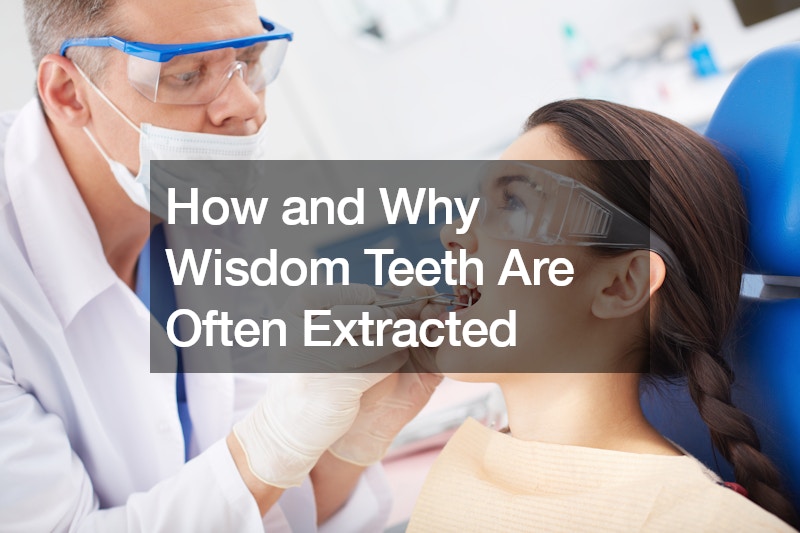

Wisdom teeth, also known as third molars, are the last set of teeth to emerge in the human mouth. While they can grow in without causing any issues for some individuals, many people experience complications associated with their wisdom teeth, necessitating their removal. In this article, we will explore the reasons why wisdom teeth are often extracted, the extraction procedure, and post-extraction care.
Understanding Wisdom Teeth
Wisdom teeth typically begin to erupt during the late teenage years or early twenties. However, due to changes in dietary habits and jaw size over time, many individuals do not have sufficient space in their mouths for these additional teeth.
As a result, wisdom teeth may become impacted, meaning they are unable to fully emerge from the gums. Impacted wisdom teeth can cause a range of problems, including pain, infection, and damage to surrounding teeth.
Reasons for Wisdom Teeth Extraction
1. Impaction: One of the most common reasons for wisdom tooth removal is impaction. When a wisdom tooth is unable to erupt properly due to lack of space or obstruction, it can become trapped beneath the gum line. This can lead to pain, swelling, and an increased risk of infection.
2. Misalignment: Wisdom teeth may also grow in at an angle, pressing against adjacent teeth. This can cause crowding, shifting of teeth, and bite problems. In such cases, extraction may be recommended to prevent further dental issues.
3. Infection: Impacted wisdom teeth can create pockets where bacteria can accumulate, leading to infections such as pericoronitis, which is inflammation of the gum tissue surrounding a partially erupted wisdom tooth. Infections can cause pain, swelling, and difficulty eating or swallowing.
4. Damage to Surrounding Teeth: Wisdom teeth that grow in at an angle or become impacted can exert pressure on neighboring teeth, causing damage such as decay, cavities, or even fractures. Removing problematic wisdom teeth can help preserve the health of adjacent teeth.
5. Cyst Formation: In some cases, a cyst may develop around an impacted wisdom tooth. Cysts are fluid-filled sacs that can cause bone destruction, infection, and damage to nearby teeth. Removing the impacted tooth and cyst is necessary to prevent further complications.
The Wisdom Tooth Removal Procedure
The extraction of wisdom teeth is typically performed by an oral surgeon or a dentist with specialized training in oral surgery. Before the procedure, the dentist will conduct a thorough examination, which may include dental X-rays to assess the position and condition of the wisdom teeth.
During the extraction procedure, the dentist will administer local anesthesia to numb the area around the tooth. In some cases, additional sedation methods such as nitrous oxide or intravenous (IV) sedation may be used to help the patient relax. Once the area is numb, the dentist will carefully remove the wisdom tooth using specialized instruments. In cases of impaction or complex extraction, the tooth may need to be sectioned into smaller pieces for removal.
After the tooth removal, the dentist may place sutures to close the extraction site and promote healing. Patients will receive post-operative instructions on how to care for the extraction site and manage any discomfort or swelling. It is essential to follow these instructions closely to ensure proper healing and minimize the risk of complications.
Post-Extraction Care
Following wisdom tooth extraction, patients may experience some swelling, discomfort, and minor bleeding at the extraction site. Pain medications and cold compresses can help alleviate these symptoms. It is essential to avoid activities that may disrupt the healing process, such as smoking, using a straw, or eating hard or crunchy foods.
Patients should also maintain good oral hygiene by gently brushing their teeth and rinsing with saltwater as directed by their dentist. Attend follow-up appointments to monitor healing and remove any sutures if necessary. With proper care and attention, most patients recover from wisdom tooth extraction without complications.
Long-Term Oral Health Benefits
Wisdom tooth extraction offers numerous long-term oral health benefits that can contribute to overall dental wellness and quality of life. Understanding these advantages can help individuals make informed decisions about pursuing extraction when necessary.
Firstly, removing problematic wisdom teeth can significantly reduce the risk of dental issues such as decay and gum disease. Impacted or partially erupted wisdom teeth are more challenging to clean properly, leading to plaque and food debris accumulation around the tooth and neighboring teeth. Over time, this buildup can increase the likelihood of cavities, gum inflammation, and periodontal disease. By extracting these teeth, individuals can maintain better oral hygiene and decrease their susceptibility to oral health problems.
Additionally, wisdom tooth extraction can prevent the development of orthodontic issues. Crowded or misaligned wisdom teeth may exert pressure on adjacent teeth, causing them to shift position or become crooked. This can compromise the alignment achieved through orthodontic treatment, leading to the need for additional corrective measures. By removing wisdom teeth that pose a risk of crowding or misalignment, individuals can preserve the results of orthodontic therapy and maintain a straighter, more functional smile.
In conclusion, wisdom teeth extraction is a common dental procedure performed to address various issues associated with the eruption of third molars. By understanding the reasons for extraction, undergoing the procedure, and following post-operative care instructions, patients can achieve optimal oral health and prevent future dental problems associated with problematic wisdom teeth. If you are experiencing symptoms related to your wisdom teeth, consult with your dentist or oral surgeon to determine the best course of action.
.
